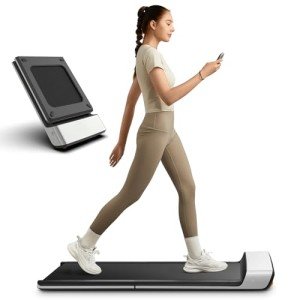12 Stats About Portable Treadmill To Make You Take A Look At Other People
The Ultimate Guide to Portable Treadmills: Fitness on the Go
In today's hectic world, where time and space are frequently high-ends we can not manage, preserving a physical fitness routine can seem like an overwhelming job. Enter the portable treadmill— an ingenious option that marries benefit with exercise. This article aims to offer an extensive understanding of portable treadmills, their benefits, considerations, types, and more.
What is a Portable Treadmill?
A portable treadmill is a compact, lightweight variation of a basic treadmill, created for simple transport and storage. These makers permit users to keep an active lifestyle, no matter where they are. Whether it's at home, the office, or during travel, portable treadmills make it much easier than ever to squeeze in an exercise.
Table 1: Key Features of Portable Treadmills
Function
Description
Weight
Generally ranges from 30 to 100 lbs
Size
Foldable or compact styles
Incline Options
Manual or automatic incline settings
Speed Range
Generally 0.5 to 10 MPH
Display Functionality
Tracking for time, range, speed, and calories burned
Foldability
Easy to keep under beds or in closets
Power Source
Electric or manual operation
Why Choose a Portable Treadmill?
1. Space-Saving Design
Many people live in homes with limited space, making large health club equipment less useful. Portable treadmills offer a compact option, folding easily for storage in closets or under beds.
2. Price
Getting a treadmill for a home health club can be a substantial financial investment. Portable treadmills are typically more budget friendly than their full-sized equivalents, making them an accessible option for many.
3. Convenience
With hectic schedules and on-the-go lifestyles, having a portable treadmill makes it easier to work out whenever and any place hassle-free. No more reasons about going to the health club— the gym can concern you!
4. Lightweight and Mobile
A lot of models are designed to be light-weight, enabling them to be quickly transported. Whether moving from space to room in your home or bringing it along on a journey, setting up a portable treadmill is problem-free.
Types of Portable Treadmills
A. Manual Treadmills
Manual treadmills operate by the user's own effort, requiring no electricity. This type is outstanding for those who desire a basic style with no frills. Nevertheless, the user has to create momentum for the belt to move, making it somewhat challenging for newbies.
B. Electric Treadmills
Electric portable treadmills are battery-operated or plug-in machines that power the belt immediately, offering varied speeds and incline alternatives. Lots of come with sophisticated features such as exercise programs, Bluetooth connection, and integrated speakers.
C. Folding Treadmills
These treadmills include a folding system, permitting the running surface to hide when not in use. Most electric treadmills fall under this category, and they typically include wheels for easy transport.
D. Under-desk Treadmills
Designed for multitaskers, under-desk treadmills enable you to stroll while working, promoting movement without interrupting your work. They are usually lower in profile to fit comfortably under standard desks.
Table 2: Types of Portable Treadmills
Type
Pros
Cons
Manual
Cheaper, no electrical energy needed
Harder to use, limited functions
Electric
Simpler to use, advanced features
More pricey, requires power source
Folding
Space-saving, simple to transfer
May be bulkier than non-folding models
Under-desk
Motivates multitasking, promotes flow
Restricted speed and incline choices
Essential Features to Consider
When picking a portable treadmill, it's essential to consider various functions to guarantee it satisfies your needs:
- Weight Capacity: Assess the optimum weight limitation of the treadmill to guarantee it accommodates all users.
- Belt Size: A larger belt size offers more convenience for running or strolling but may use up more space.
- Incline Ability: Incline choices can add intensity to workouts, making it an important consideration.
- Digital Display: An user-friendly display screen that tracks essential data is helpful for keeping an eye on physical fitness progress.
- Security Features: Look for safety features such as emergency situation stop buttons to prevent accidents.
Often Asked Questions (FAQ)
Q1: Are portable treadmills appropriate for running?
A1: While some portable treadmills can accommodate running, many are much better suited for strolling or light running. Ensure the design you select has an enough speed variety and belt size for your meant usage.
Q2: How much should I expect to spend for a portable treadmill?
A2: Portable treadmill costs can differ extensively, from around ₤ 100 for fundamental manual designs to over ₤ 500 or more for sophisticated electric models with many features.
Q3: How do I keep a portable treadmill?
A3: Regular upkeep includes cleaning up the belts, lubricating moving parts, and looking for any electrical problems. Following hometreadmills will help extend the treadmill's lifespan.
Q4: Can I use a portable treadmill outdoors?
A4: Ideally, portable treadmills are developed for indoor usage. For usage outdoors, ensure the design is weather-resistant which it stays in a dry environment.
Q5: Do portable treadmills have a weight limit?
A5: Yes, most portable treadmills have a defined optimum weight limit, usually ranging from 220 to 350 pounds. Check the specs before acquiring.
Portable treadmills provide an unbeatable combination of benefit, price, and adaptability. They provide an outstanding solution for anybody wanting to keep a physical fitness regimen regardless of a hectic lifestyle. By understanding the types, essential functions, and considerations, consumers can make informed options that line up with their fitness objectives. Whether it's a quick walk throughout a break or a busy run, a portable treadmill can help pave the way to a much healthier lifestyle— any place you are!
